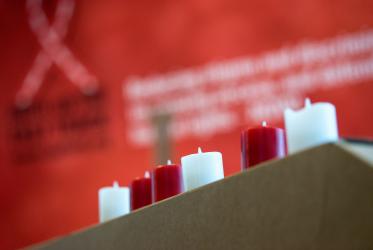Churches are engaged at the grassroots level throughout the world in the response to HIV and AIDS, but the struggle against the disease and those stigmatized for being HIV positive needs to continue, say church leaders.
Two million people a year become HIV-positive and many of those infected are not even aware of their HIV status, said moderator Claus Grue as he introduced a group of panelists during the 23-28 June Central Committee meeting of the World Council of Churches (WCC).
“The billboards have been taken down, but within the WCC we realize it [HIV and AIDS] is not over, and we need to keep up the campaign to raise awareness in our member churches,” said Prof. Dr Isabel Apawo Phiri, WCC associate general secretary, referring to some African countries.
She noted that, in her home environment in Malawi, she and her immediate family have been directly impacted by the disease.
Phiri and the other panelists stressed that HIV and AIDS is a “medical condition and not a moral condition”.
The panelists also agreed that social and gender justice issues are all involved in taking care of the problem.
“We don’t know when it will be over. We will continue campaigning until it is over,” said Phiri.
She noted that WCC involvement with HIV and AIDS goes back to 1984 when awareness was just beginning.
She said that, with faith-driven affirmation of universal humanity, the WCC has worked with other ecumenical partners as well as the WHO (World Health Organization) and later UNAIDS.
Metropolitan Dr Geevarghese Mor Coorilos, Syrian Orthodox Patriarchate of Antioch and All the East said, “For us, the Orthodox, our theology is centred around the notion of the Holy Trinity - within the Godhead.”
Coorilos said that all life is considered holy and sacred and the characteristics within it are the values of mutuality, interdependence, dignity and justice.
“There is no room for any kind of discrimination, be it on the basis of sex, class, caste, medical status, disability, you name it,” he said.
Rev. Rex Reyes Jr, general secretary of the National Council of Churches in the Philippines, said the HIV and AIDS campaign in his country is in unison with the Orthodox position of dignity, humanity and the involvement of young people.
“Given the number of people with HIV in my country we have had to come out with more practical way of dealing the issues, that is, an aggressive education and we have to get the church leaders to walk the talk,” he said.
The programme encourages church leaders to have HIV testing in order to help encourage young people not to be afraid to get tested.
Reyes himself was photographed being tested and featured on a national billboard poster for which some people criticized him, but he said it increased national awareness on HIV and AIDS.
In the Philippines, churches have found they not only have to work together but also with allied organizations which are not necessarily faith-based organizations. He also said his church’s campaign extends to people in the lesbian, gay, bisexual and transgender community.
Rev. Amin Sandewa of the Evangelical Lutheran Church in Tanzania belongs to a national network of religious leaders living with or personally affected by HIV or AIDS and he has a deeply personal experience of the disease.
“I lost my two daughters and my wife to HIV,” said Sandewa explaining that disclosure of the disease is vital in preventing it spreading.
“The challenge is why people are not ready to disclose,” he said, affirming the campaign of Reyes.
“In my network we have more than 400 religious leaders who are HIV positive but only 10 have disclosed,” he said referring to the stigma that still remains.
He said another challenge is that of sexual morality, agreeing that “this is a health issue more than a moral issue” and that, in seeking to educate people, churches have to reach out to people who may be ignored, such as sex workers.
“In Tanzania there can be clash between the religious approach and medical approach,” said Sandewa, espousing more openness in dealing with the disease.
Panelists emphasized that the scaling up of advocacy, accompaniment and service provision is critical in ending HIV. They were clear that this could only be achieved by the significant support and mobilization of the faith community.







